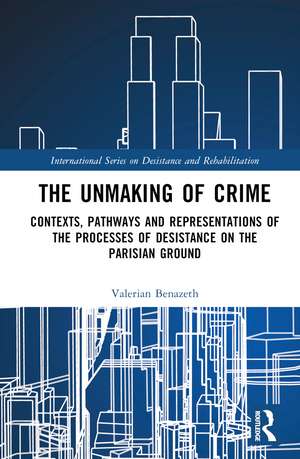The Unmaking of Crime: Contexts, Pathways, and Representations of the Processes of Desistance on the Parisian Ground: International Series on Desistance and Rehabilitation
Autor Valerian Benazethen Limba Engleză Hardback – 29 noi 2024
Building on original qualitative research in Paris, the book considers a range of factors in the process of desistance, such as spheres of socialisation, the role of stigma and the opportunities offered or denied after a time in a criminal lifestyle, and the relationship between those seeking to desist from crime and key institutions and resources.
Din seria International Series on Desistance and Rehabilitation
-
 Preț: 310.84 lei
Preț: 310.84 lei - 9%
 Preț: 1005.06 lei
Preț: 1005.06 lei -
 Preț: 310.51 lei
Preț: 310.51 lei - 9%
 Preț: 1005.14 lei
Preț: 1005.14 lei -
 Preț: 308.93 lei
Preț: 308.93 lei -
 Preț: 406.97 lei
Preț: 406.97 lei -
 Preț: 385.25 lei
Preț: 385.25 lei -
 Preț: 434.83 lei
Preț: 434.83 lei -
 Preț: 385.62 lei
Preț: 385.62 lei -
 Preț: 449.41 lei
Preț: 449.41 lei -
 Preț: 416.22 lei
Preț: 416.22 lei -
 Preț: 392.50 lei
Preț: 392.50 lei -
 Preț: 484.69 lei
Preț: 484.69 lei -
 Preț: 389.38 lei
Preț: 389.38 lei - 21%
 Preț: 257.76 lei
Preț: 257.76 lei -
 Preț: 411.64 lei
Preț: 411.64 lei -
 Preț: 233.25 lei
Preț: 233.25 lei - 5%
 Preț: 1160.70 lei
Preț: 1160.70 lei -
 Preț: 464.76 lei
Preț: 464.76 lei -
 Preț: 341.86 lei
Preț: 341.86 lei -
 Preț: 389.66 lei
Preț: 389.66 lei -
 Preț: 349.71 lei
Preț: 349.71 lei - 17%
 Preț: 258.70 lei
Preț: 258.70 lei - 18%
 Preț: 1000.87 lei
Preț: 1000.87 lei - 18%
 Preț: 1000.58 lei
Preț: 1000.58 lei - 18%
 Preț: 946.93 lei
Preț: 946.93 lei - 18%
 Preț: 1061.84 lei
Preț: 1061.84 lei -
 Preț: 388.13 lei
Preț: 388.13 lei - 5%
 Preț: 1047.47 lei
Preț: 1047.47 lei -
 Preț: 430.80 lei
Preț: 430.80 lei
Preț: 904.00 lei
Preț vechi: 993.41 lei
-9% Nou
Puncte Express: 1356
Preț estimativ în valută:
173.00€ • 179.95$ • 142.82£
173.00€ • 179.95$ • 142.82£
Carte tipărită la comandă
Livrare economică 14-28 aprilie
Preluare comenzi: 021 569.72.76
Specificații
ISBN-13: 9781032457321
ISBN-10: 1032457325
Pagini: 346
Ilustrații: 70
Dimensiuni: 156 x 234 mm
Greutate: 0.8 kg
Ediția:1
Editura: Taylor & Francis
Colecția Routledge
Seria International Series on Desistance and Rehabilitation
Locul publicării:Oxford, United Kingdom
ISBN-10: 1032457325
Pagini: 346
Ilustrații: 70
Dimensiuni: 156 x 234 mm
Greutate: 0.8 kg
Ediția:1
Editura: Taylor & Francis
Colecția Routledge
Seria International Series on Desistance and Rehabilitation
Locul publicării:Oxford, United Kingdom
Public țintă
Postgraduate and UndergraduateCuprins
1. Introduction: beyond ‘us’ and ‘them’ 2. Understanding knowledge about desistance: The empirical and practical contribution of a continent of research 3. Methodology: retracing desistance journeys using in-depth interviews 4. Is there a French accent in desistance processes? 5.The economics of desistance: experimenting with the limits of its power to deconstruct the cult of money 6. Desistance and religion: a passport to redefine one’s affiliations? 7. The intertwining of addictions in desistance processes: the role of an airlock or a bridge 8. Becoming an ordinary citizen again: another anchor for the desistance processes 9. The ambivalent effects of prison 10. Desistance and probation: the paradox of limited institutional effects 11. Desistance and electronic surveillance: leverage with varying degrees of success 12. Contextualising and extending knowledge about desistance
Recenzii
"Beginning with a Durkheimian understanding of crime and punishment, Benazeth has produced a fully French reconceptualization of the desistance concept that is theoretically sophisticated and critically nuanced in way that few can do as well as the French. A gift to criminology akin to the Statue of Liberty."
Shadd Maruna, Professor of criminology, Queen’s University Belfast.
"Prison overcrowding is a problem as old as the prison itself, but in the late modern period it has reached unprecedented heights and combined with long sentences and aging prisoners is creating a humanitarian disaster in many countries. In this much needed book, Valerian Benazeth points to a hopeful way out too often abandoned or overlooked by contemporary prison services, learning from the many former prisoners who have desisted from crime and no longer need prison bars to protect safety.”
Jonathan Simon, Lance Robbins Professor of Criminal Justice Law, Berkeley University.
Shadd Maruna, Professor of criminology, Queen’s University Belfast.
"Prison overcrowding is a problem as old as the prison itself, but in the late modern period it has reached unprecedented heights and combined with long sentences and aging prisoners is creating a humanitarian disaster in many countries. In this much needed book, Valerian Benazeth points to a hopeful way out too often abandoned or overlooked by contemporary prison services, learning from the many former prisoners who have desisted from crime and no longer need prison bars to protect safety.”
Jonathan Simon, Lance Robbins Professor of Criminal Justice Law, Berkeley University.
Notă biografică
Valerian Benazeth holds a PhD in Political Science from the university of Paris-Saclay (France) and is an associate researcher at the CESDIP Research Centre. Educated in France and in the United States as an exchange student (UTEP, TX), and then as a teaching assistant (Williams College, MA), he conducted one of the first empirical studies about desistance in France. His doctoral research integrated three years of fieldwork and received merit scholarships from the City of Paris and from the French Department of Justice. After serving for a time as the head of the research department inside the French Youth Justice Board, he resumed teaching at university in France.
Descriere
The Unmaking of Crime documents the pathways of offenders reforming their journey and desisting from crime, and assesses the opportunities and limitations of the criminal justice system in aiding this process.
